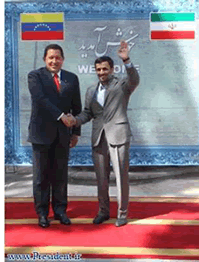
| THINK-ISRAEL |
| HOME | September-October 2009 Featured Stories | Background Information | News On The Web |
1. The increasing regional and international interest in the renewed Israeli-Palestinian peace process led to an outburst of criticism in the Iranian media, which condemned any political agreement with Israel and emphasized the "resistance" [i.e., terrorism] ("until Israel is wiped off the face of the earth and the cancerous growth is excised from the Middle East"). Jerusalem Day, which falls on September 18 this year is expected, as in previous years, to draw similar militant rhetoric from Iran. Iran also expressed harsh criticism of its Persian Gulf neighbors, who , in its opinion, were more moderate in their remarks about Israel. Iran was particularly vicious toward Bahrain's crown prince, calling him "stupid," when he mentioned that discourse with Israel was important.
2. This past month Iranian defiance of Israel and the West reached new heights with President Ahmadinejad's decision to nominate Ahmad Vahidi to the post of defense minister in his new government, which won an overwhelming victory in the Majlis (the Iranian parliament). Ahmad Vahidi was a former commander of the Qods Force, which supports terrorist organizations outside Iran. There is an outstanding Interpol warrant for his arrest because of the key role he played in the Hezbollah suicide bombing attack on the AMIA (Jewish center) building in Buenos Aires in 1994, which killed 85 civilians and wounded hundreds. Ahmad Vahidi's first statement as minister (in answer to a question) was in reference to threats he claimed were made by Israel. He said that "the answer is hidden in the second Lebanon war and Operation Cast Lead," showing that Iran's power and might were at the disposal of the Muslim nation of communities and that his overwhelmingly-approved appointment was a slap in the face for the forces working against Iran.
3. Iran has been indicating that it intends to pursue a tough, uncompromising foreign policy during Ahmadinejad's second presidency. That was manifested by Ahmadinejad's stressing the alliance between Syria and Iran when President Assad visited to Tehran to congratulate him on his "victory" in the elections, and during Venezuelan President Chavez' visit to Iran (September 5). Facing the international arena, Iran presents a regional ideological alternative inspired by "the values of the resistance" to the American peace plans for the Middle East, while it ignores the signals from Washington for a dialogue (regarded by Iran as a sign of weakness, which affects Israel as well). Ahmad Vahidi told the Majlis that Iran's first consideration was its strategic status and that Iran would deal with the interests of "the arrogant powers" [i.e., the United States], presenting its own alternative based on the ideology of the Islamic revolution, its own interests and its national security (Mardom Salari, Iran, September 2, 2009).
4. The current Iranian leadership, controlled more and more by the Revolutionary Guards, is of the opinion that it has the military and ideological-religious capabilities to breathe new life into the original sentiments of the Muslim-Arab peoples: hatred for Zionism, the establishment of the State of Israel (the "cancerous growth") and the West which supported it after the Holocaust ("an imaginary event"). Iran fully understands that such ideas are not foreign to the Middle East but have burned out and been worn down by "treacherous Arab rulers" such as Anwar Sadat, Hosni Mubarak, King Hussein and King Abdallah, the first three of whom signed peace agreements with Israel. Iran is therefore employing themes familiar to Arab ears to renew old ideas, representing the models of Hezbollah and Hamas, both of which it fosters, as having successfully coped with Israel's military might thanks to Tehran.
5. In that spirit, this month Iran marked the third anniversary of the second Lebanon war with obvious satisfaction, congratulating Hezbollah on its actions since the war and happily proclaiming the weakness of Israel and the United States. In our assessment, how Iran regards the second Lebanon war reflects popular spirit in Tehran. It focuses on the "success" of Hezbollah — which it created — to change regional equations and gradually tip the scales toward Iran and Hezbollah at the expense of Israel and the United States. In dealing with the second Lebanon war Iran was able to refurbish its basic perception of "the role of Israel as a regional scarecrow and agent of the [American super-] power," stressing the part played by the Arab countries, especially Egypt, in betraying the Palestinian cause, while in comparison it could point to its Middle East model, Hezbollah.
6. Senior figures in Iran and the Iranian media continue their propaganda war against Israel, grasping at every possible straw to defame it. For example, a new Friday preacher, Hojjat al-Islam Kazim spoke about what he called "Israel's crimes" in regard to the alleged organ-theft from Palestinian cadavers (a libel directly copied from the article in the Swedish Svenska Dagbladet). He said that "the arrogant Western world is more preoccupied with the right of animals than it is with the rights of humans, and the [Muslim Shi'ite Mahdi will soon take revenge" (Radio Iran, Friday sermon, August 28, 2009).
7. With regard to Iran's nuclear program, Tehran continues to claim that the United States has already accepted a nuclear Iran and that only Israel has not yet understood the message surfacing from Washington, and that Israel remains the only factor which continues to call for a military attack on Iran ("There are no other supporters for the idea outside the insane asylum called Tel Aviv.") That does not keep Iran from sharpening its deterrent rhetoric by claiming that it has improved the accuracy of its ground-to-ground missiles. Iran also stresses that without its participation in the key issues — from Afghanistan to Lebanon — it will be impossible to resolve any problem in the Middle East.
| 8. In conclusion, Ahmadinejad's regime, which brutally suppressed the popular protests held against the rigged elections, shows it intends to pursue an uncompromising foreign policy toward the West, particularly the United States and Israel. It thoroughly exploits the "soft power" America is trying to market in the Middle East and the Obama administration's new attitude toward the Arab-Muslim world. Iran, which radiates its power in the region, claims it is ready to put its military might at the disposal of Muslims and is a growing power in the Middle East, and it does not hesitate to use rhetoric of Israel's destruction or to overtly defy the West. |
9. The interest shown by the international community in President Obama's expected political initiative to reactivate the Israel-Palestinian peace process, and his desire to gain Arab concessions for Israel within the process, were harshly criticized in Iran. The Iranians claim that America's intentions are insincere and that the United States continues to take Israel's side. They also blame a number of "stupid" Arab countries for subservience to the United States and for working for the good of "the Zionist regime," while stressing the fact that the only "real solution" possible is the destruction of Israel.
10. On a number of occasions Ahmadinejad has stated that he intends to pursue an aggressive foreign policy and to put Iran at the head of the American peace initiative rejectionists in the Middle East. He criticized "a number of neighboring countries" which had adopted political positions which play into Israel's hands. He said "We are sorry for those countries around us and those neighbors which are at the service of the Zionists in the name of Islam [a reference to statements made by Oman, Qatar and Bahrain regarding relations with Israel] and are providing means of their hegemony over the world...They don't understand so they provide the Zionists with their possibilities, we hope that they wake up."[1 ]
11. Ahmadinejad exploited the visit of Venezuelan President Hugo Chavez in the to reiterate his anti-American ideology and to present his own alternative. "Aiding the oppressed and revolutionary nations and expanding the anti-imperialism front in the world are the two crucial missions of Iran and Venezuela" Islamic Iran's President Mahmoud Ahmadinejad said, underlining that the era of the powers' clout over revolutionary nations has come to an end. "Providing aid and assistance to the oppressed and revolutionary nations and expanding the anti-imperialism front in the world are the two crucial missions of Iran and Venezuela," Ahmadinejad said in a meeting with the visiting Venezuelan President, Hugo Chavez, in Tehran.

12. The following are prominent remarks from the leading Iranian media about President Obama's peace initiative and Arab political positions. The ultra-conservative daily Kayhan, which reflects the positions of the Iranian Supreme Leader and indicates the directions in which the current regime is headed, and Jomhouri Eslami, both espousing a extremist nationalist ideology, again called for the destruction of the State of Israel, rejecting any compromise with it:
i) On August 9, 2009, Kayhan published an editorial by Hussam al-Din Boroumand entitled "The only way is to wipe out Israel:"a) According to the article, the Obama peace initiative is nothing more than a propaganda maneuver and not really supposed to be implemented. While there is talk of launching it, "the Zionists continue developing the settlements, even though Washington is theoretically trying to stop the process." Moreover, the Obama administration is attempting to normalize relations between the Zionist regime and the Arab countries, "and what is interesting is the barefaced, unilateral conditions proposed by the Zionist heads to that end:...recognition of Israel as a Jewish state and the non-implementation of the right of return. The ratification of the land reform program [in Israel] was the last straw for the peace plans in the Middle East." The program again showed "the blacker than black diploma of the Zionist regime in its 60 years of existence and proved that the counterfeit regime never believed in peace, and the only things it has done with American support are [implementing] the illegal occupation of Arab lands and the slaughter and murder of innocent Palestinians...The last decision made by the Zionist parliament shows it intends to carry out another crime and has removed the issue from its Palestinian agenda."b) Kayhan added that without a doubt, "the awareness of the Islamic world and the firm stance of the resistance [terrorist organizations] will neutralize the plot and prevent it [from being carried out]...The inhuman crimes of the Zionist regime in the last war [Operation Cast Lead] proved to the world that the Zionists are interested only in war and killing as the means to realize their exaggerated demands and the idea of a Greater Israel from the Nile to the Euphrates..." In view of the situation, Kayhan concluded, the Muslim world must proclaim a political alert and exploit the potential of the Islamic countries, especially in everything concerning the option of resistance [terrorism], and to concentrate on the only solution for the Zionist regime, which is to cut the cancerous growth out of the map of the world. The Organisation of the Islamic Conference, said Kayhan, should hold an emergency meeting to discuss how to excise the cancerous growth once and for all.[2]
ii) According to an editorial in Jomhouri Eslami, the new reconciliation initiative to be unveiled shortly by President Obama is in fact intended "to buy time for the Zionist regime to extricate itself from its lethal situation in Palestine, the region and the international arena." Jomhouri Eslami claimed that the initiative was also intended to represent the Obama administration as an honest broker seeking peace. In reality, however, said the editorial, the way to achieve peace in the Middle East was simple and very clear: "The regime that forcefully occupied lands and drove an entire people out of their homeland has to leave the occupied territories unconditionally [referring to the entire State of Israel]...As long as the Palestinians have not had their trampled rights restored to them, even if politicians sign agreements, they will have no genuine validity and will never guarantee a genuine, stable peace..."[3]
iii) Jomhouri Eslami attacked the Bahraini crown prince as well as "the stupid, incompetent Arab princes" who take "shameful" positions which favor Israel. [Note: The attack was based on manipulations of an interview given by the crown prince to The Washington Post.] On September 1 Jomhouri Eslami attacked the Bahraini crown prince who claimed that "It was the right of the Zionist occupiers to hate Muslims because Muslims have harmed them throughout history, and the Zionists have no intention of wiping out or oppressing the Palestinians." [Note: What the crown prince actually said in the July 16, 2009 issue of The Washington Post in an article entitled "Arabs need to talk to the Israelis"[4] was that "an Israeli might be forgiven for thinking that every Muslim voice is raised in hatred, because that is usually the only one he hears."]. Jomhouri Eslami noted that it was not the first time that "the dishonorable Arab kingdoms have harnessed themselves to the interests of the Zionist occupiers. It noted one serious point of the Bahraini crown prince's article was "calling the Israeli people an important side in the conflict." [Note: What the crown prince actually said was "peace between equals."] According to the Jomhouri Eslami, there is no doubt that the Arab kingdoms not only never tried to support the Palestinian people, but that they always did everything the could to make the resistance [terrorism] fail and encourage surrender to the occupiers. "[The Bahraini crown prince's] remarks, as expected, were received with great enthusiasm in Zionist and American circles. While the daily catastrophes of the Palestinian people enrage even the firmest supporters of the Zionist regime, the stupid, incompetent Arab princes take shameful positions which favor the illegal interests of the Zionists and continue their treacherous ways. Even the Americans have demanded the end of [building in] the settlements, but that stupid crown prince calls the Arabs a reason for the hatred of the Zionists!"[5]
iv) Damage to Israel's relations with the United States expected: A new article was published by the online opinion magazine "Iran Diplomacy," which posts editorials and is directed by the former Iranian deputy foreign minister. The article asked why Israel continued threatening Iran despite the demand of the Obama administration that they not do so and in view of the American assessment that Iran would not acquire nuclear weapons in the near future. The article wondered whether the coordination and trust between Israel and the United States had been damaged.[6]
13. Ahmad Vahidi, formerly the commander of the Qods Force of the Revolutionary Guards and wanted for his involvement in international terrorism, is a member of the new government, filling the key post of defense minister. The new government was overwhelmingly ratified by the Majlis (227 of the 295 Majlis members).
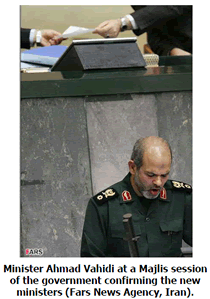
14. The appointment of Ahmad Vahidi is more evidence of Iran's intention to pursue a defiant, revolutionary agenda, where emphasis will be placed on support for the terrorist and Islamic networks around the world, especially the Middle East. In addition, his appointment is also clearly in defiance of the West, and shows that Ahmadinejad is intent on proving his self-confidence, contempt, insensitivity and lack of consideration for international norms, as well as his intention to pursue energetically an aggressive foreign policy whose objective is to position as Iran the dominant influence regionally and internationally, opposing what he called "the hegemony and plans [i.e., plots] of the arrogant powers for the Middle East"[7]
15. Ahmad Vahidi's first statement (in answer to a question) after his nomination was ratified related to Israel's threats against Iran. He said that "the occupying regime of Qods has got its answer during the 33-day and 22-day wars with Lebanon and the Palestinians respectively. Iran's might belongs to all the Muslims across the world,"[8] and that the acceptance of his nomination by an overwhelming majority was a slap in the face to Iran's enemies.[9]
16. Iran was quick to respond to Israeli and Argentinean criticism of Ahmad Vahidi's nomination (other Western countries kept a low profile regarding the exceptional nomination of a terrorist wanted by Interpol to a sensitive government post). Various Iranian spokesmen noted that the "Zionist influence on the Argentinean judicial system is well-known," and that Israel's protests and claims would only encourage the Majlis to ratify Vahidi's nomination. In fact, in Majlis deliberations for ministerial ratifications and in discussing their talents, a number of parliamentarians, among them Haadi Qavami, who at first had registered to speak against Vahidi, stressed that following Israel's reaction they had decided to vote in favor.[10] He said that "Israel's satanic position and its intervention convinced me not only not to speak against Vahidi, but to give him my full confidence." Similar remarks were made by other Majlis members, accompanied by shouts of "Death to Israel."[11]
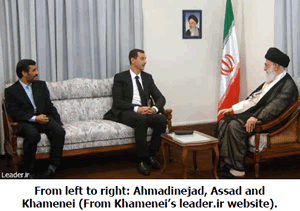
17. Syrian President Bashar Assad, who prefers Iran to the united States, visited Tehran on August 19 to personally congratulate Ahmadinejad on his "victory" in the [contested] elections. His visit strengthened the tripartite Iran-Syria-Hezbollah alliance. In addition, at the end of August the Iranian foreign minister paid a surprise visit to Syria and met with President Assad.
18. Assad, accompanied by Ahmadinejad, was favored with a meeting with Supreme Leader Khamenei. Khamenei described "Iranian-Syrian unity" as an expression of the regional trend of "resistance." He said that present conditions in the Middle East had tipped the scales "in favor the forces of resistance" and away from the United States and its allies, and therefore Iran and Syria should strengthen the foundations for mutual collaboration.
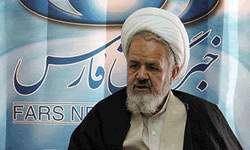
19. Khamenei said that "the influence of the alliance between Iran and Syria can be felt throughout Palestine, Lebanon and Iraq, and it blunted the United States' sword in the region...It makes no difference who is in the White House, he will not be able to advance his objectives here...Even the Zionist regime is facing an endless number of problems at home and is getting weaker every day, despite its propaganda..."[12] In turn, Assad described Syria's alliance with Iran as "strategic," saying that "conditions in the area favor the resistance...The western governments have economic problems as well as problems in our region, including Lebanon."[13]
20. Senior Iranian figures were quick to exploit Assad's visit to stress Iran's regional power and the importance of the "resistance" [i.e., the terrorist organizations]. Ali Saeedi, Representative of the Supreme Leader of the Islamic Revolution to the Islamic Revolution Guards Corps, said that "Iran can have the final say in the Middle East region [ITIC emphasis] and in many international equations and [the Western powers] know that the problems in Afghanistan, Lebanon and Iraq are insolvable without the Islamic Republic's presence." He said that "the Westerners are aware of the fact that they should compromise with the powerful Iran...[and that] political games and maneuverings by the West, including recalling ambassadors of the western capitals from Iran, would leave no impact on Iran's clout and power."[14]
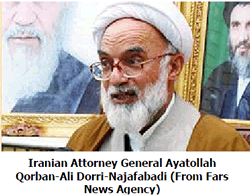
21. Iran's Attorney General, Ayatollah Qorban-Ali Dorri-Najafabadi, called the Islamic resistance "a duty and a responsibility that has prevented expansion of the occupying Zionist regime from the Nile to the Euphrates." He said that the resistance had made the enemies of Islam desperate and disappointed, adding that "not just Iran, Syria or some friends in the region that support resistance, the strategy of resistance has penetrated to the farthest parts."[15]
22. In general, Tehran views the results of the second Lebanon war as the greatest achievement resulting so far from its investment in Lebanon. Until the war, the IDF withdrawal from Lebanon in May 2000 was regarded by the Iranian rulers as the first victory of the Islamic revolution outside Iran. According to Ali Akbar Velayati, Khamenei's advisor on international affairs, it "turned a new leaf in the history of the struggle of the Muslim Palestinian community" and heralded the outbreak of the second intifada. The second Lebanon war ("the 33-day war") has already been dubbed as a "divine victory" by the Iranian leadership and their Lebanese proxy Hassan Nasrallah.
23. The second Lebanon war and Hezbollah's achievements during it are perceived by Iran as a "model" for the campaign against Israel. It reinforced Iran's feeling that the "Shi'ite Islamic model" could, at the right time, be exported. Lebanon serves as a laboratory for the clash of ideologies and dominance for the future of the Middle East in general and Lebanon in particular. On the one hand there are multi-ethnic pro-Western supporters of the democratic system, backed by the West and pro-Western Arab countries; on the other, supporters of revolutionary Islam led by Iran and Hezbollah, who use Lebanon as a forward post in the struggle against Israel. Syria, the main channel for through which Iran arms Hezbollah, plays a special role, as was illustrated by Bashar Assad's visit to Tehran.
24. The great importance Hezbollah holds for Iran was illustrated by a rare interview Ali Akbar Velayati recently gave to Al-Jazeera TV. He admitted, not for the first time, that Iran provided extensive support to Hezbollah and Hamas and that without it the two "would not have won the second Lebanon war and Operation Cast Lead." He said that Iran "fully supported Hezbollah and took responsibility for Hamas during the [Israeli] attack [Operation Cast Lead] on the Gaza Strip. I can tell you with complete sincerity that Iran fully and comprehensively supported Hezbollah, and Hezbollah feels indebted to the [Iranian] leadership." Sheikh Naim Qassem, Nasrallah's deputy, recently said that the Imam Khamenei was the one who "decides general guidelines for us, which free us from blame and give us legitimacy." He said that Hezbollah would not wage war on Israel without religious authorization from the "guardian jurist" of Iran [i.e., Khamenei, Iran's Supreme Leader], who was a clerical authority,[16] although waging the war itself was in Hezbollah's hands."
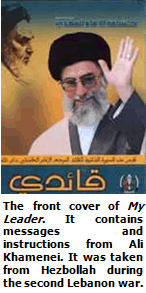
25. During the second Lebanon war the IDF seized a booklet from Hezbollah operatives entitled My Leader. It contained messages and instructions from Khamenei to Hezbollah operatives in the Khomeinian ideology, modified for the Lebanese arena. The booklet emphasizes the Shi'ite revolution and Iran as having brought it to pass, giving revolutionary spirit and the willingness to sacrifice as the two central components for the moral and physical battlefields. It ends by stressing the universal message of Islam and in the first person singular appeals to "the faithful fighter who wages holy war on the infidels...which is part of revolutionary Islam and stands for the end of deprivation and encourages the various peoples to cast off the burden of arrogance." Since his election to a second term, Ahmadinejad has made similar statements.
26. Of all the articles about the second Lebanon war written in Iran, one editorial stands out. It appeared in the conservative Jomhouri Eslami (which is critical of the regime), whose opinions are extremely nationalist and vituperatively anti-Arab. The editorial, entitled "The 33-day war and the change of regional equations,"[17] gives prominence to remarks made by Hassan Nasrallah marking the third anniversary of the war and claiming that until the second Lebanon war "the Zionist regime saw only victories, and every confrontation with an Arab country ended with the occupation of Arab land, the deaths of Muslims and many concessions from the Arab side." Even the Yom Kippur War (which Egypt boasts about), said the editorial, ended with a great political victory for Israel: Egyptian recognition. It was "a treacherous step taken by Sadat, who signed a peace treaty with Israel and broke the back of the Palestinians who staggered under the Israel burden until even Arafat was forced to recognize the existence of Israel." However, according to Jomhouri Eslami, the second Lebanon war "shattered, once and for all, the myth (planted in the hearts of the Arab rulers) of the invincible Zionist enemy" for the first time, Israel, equipped from head to toe with Western weapons, "was defeated by 10,000 fighters and received the greatest humiliation in its history."
27. The editorial contains most of the fundamental ideology of Khomeini and the current Iranian regime regarding Israel and its role in the region. It goes on to claim that the "arrogant powers" (the West, particularly the United States) which "use the Zionist regime as a scarecrow and agent to promote their colonial goals in the Middle East and as a means to suppress the [Arab] nations and threaten local leaders, all at once lost their main proxy when Israel was humiliated by Hezbollah fighters." The editorial also made a point of honoring and admiring Hezbollah, which was responsible for the victory of the few over a well-armed Israel, a point of light for the Arab nations in the region.) "The war made the Arab nations believe that the Zionist regime, as opposed to the propaganda it spreads, is hollow and vulnerable...No one in the region will again believe in its military superiority."
28. This month as well, the media and senior members of the regime in Iran dealt with the issue of foreign intervention, including Israeli, in internal Iranian affairs in general and of an attempt to generate a "velvet revolution" after the elections. Kayhan reported that Israeli, British and American intelligence services had plans concerning the Friday prayer which former Iranian President Rafsanjani was supposed to deliver. The paper said that the services were frustrated and disappointed when Rafsanjani decided not to participate in the Friday prayer, because they had plans to encourage disturbances.[18] Note: In the middle of July Rafsanjani delivered a sermon criticizing the regime and initiating the wave of reformist camp protests against the Iranian regime.
29. Ali Akbar Velayati, Khamenei's advisor in international affairs, claimed that "when Obama and Shimon Peres support a specific candidate, in this case Moussavi, he should stand up and publicly reject their support." He added that the West had failed in Lebanon and that Iranian support for Hezbollah had greatly influenced the failure. The West was trying to intervene in internal Iranian affairs [the elections], and therefore anyone interested in holding an official government position had to clarify his links to hostile countries. "It is very strange and surprising that a candidate who won the support of the munafiqun (hypocrites, also the name of a Qur'an Surah. It is an Iranian regime epithet for the opposition group, the Mujahedeen Khalq), the United States and Israel, does not try to cleanse himself of that support."[19] Kayhan continued its wild attacks and incitement against Mir-Hossein Moussavi, saying that his new political party (the "green movement") was nothing more than a red carpet rolling out to welcome the United States and Israel. "Look at who the movement's supporters are: the United States, corrupt elements, the Baha'i, Marxists...all those which Islam slapped in the face..."[20]
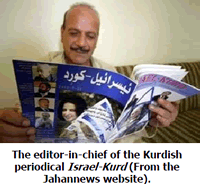
30. For a number of months Iran has been reporting on what it calls Israeli activity in the Kurdish region. The Jahannews website, affiliated with the Iranian Ministry of Intelligence, recently noted that a monthly publication in the Kurdish language is issued in Iraqi Kurdistan called Israel-Kurd calling on Jews of Kurdish extraction living in Israel to return to their homeland, i.e., northern Iraq. According to the posting, Mohammad Reza Ali Zamani, detained in Iran, admitted his ties to Davoud Baqestani and an American Army officer in Iraq. They allegedly collaborated to publish the magazine to return Kurdish Jews to Iraq.[21]
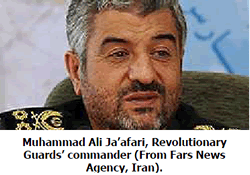
From Fars News Agency, Iran31. Iran continues formulating a policy to deter the West as an integral part of building its regional position. It emphasizes that its ground-to-ground missile capabilities and aerial defenses keep improving, and manifests willfulness regarding its nuclear program. Iran consistently boasts that the United States has in fact accepted its nuclear program and now has no choice but to open channels to dialogue with it.
32. Mohammed Ali Ja'afari, commander of the Revolutionary Guards, recently said that they had succeeded in increasing the accuracy of their ground-to-ground missiles using advanced technology, while also increasing the operational preparedness of the missile units. He added that great strides had also been taken in aerial defense and intelligence awareness.[22]
33. According to an article in Kayhan, Israel still thinks it only has two choices: life under the continual threat of a nuclear Iran or a preemptive military strike against it. The article, reflecting the opinion of the Iranian leadership, called the latest IAEA report about Iran's nuclear program "repetitious." It said that technically speaking there were minor changes in the document, but that compared to the political aspect, the legal and technical aspects were minor and could be ignored. Kayhan called attention to the influence of the report on the political circumstances related to the nuclear issue and Iranian national security, and claimed that according to remarks made by Americans, Europeans and Zionists, it was clear that they were of the opinion that the publication of a negative report was vital for the strategy of the 5+1 Group [the permanent members of the UN Security Council and Germany] against Iran. In reality, wrote Kayhan, despite all the ups and downs in the Obama administration's dealings with Iran, the necessity of a dialogue between the two remained unchanged, because the United States was so intricately entangled in the region that it could not waive a dialogue with Iran.
34. Kayhan added that the problem was that the West felt Iran did not find a dialogue necessary, and was particularly worried. The West, said the paper, was afraid of an Iranian surprise and therefore currently focused on motivating the process rather than on its results. The outcome, as opposed to the past, was that the West no longer employed delaying tactics because it understood it had an "important choice" to make. On the other hand, the Israelis were of the opinion that there were only the two aforementioned alternatives, living with the threat of a nuclear Iran or a military attack against it. Apparently, said Kayhan, no one outside "the insane asylum called Tel Aviv" supports that view. Even the Americans made it clear that there was only one alternative, accepting Iran into the nuclear club.[23]
35. Iran's Ambassador to the IAEA Ali-Asghar Soltanieh called for a ban on any militant attack on its nuclear installations. Asked at a press conference about the coincidence of Iran's proposal with Israeli threats to attack Iran, Soltanieh replied, "We're not concerned about Israel. No one dares to do anything against Iran."[24]
36. The senior Ayatollah Ja'afar Sabhani claimed that the Jews were responsible for a "conspiracy" to manufacture jeans with "There is no God but Allah" embroidered on the back pocket. The jeans were recently sold in stores in Tehran. The Ayatollah issued a fatwa against selling and buying them.[25]
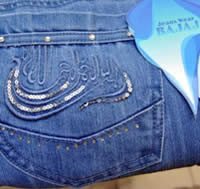
From http://farzadnf.blogfa.com Another "Jewish conspiracy:" "There is no God but Allah" embroidered on the back pocket. (From http://farzadnf.blogfa.com/).
Footnotes
1 http://tabnak.ir/fa/pages/?cid=61823.
2 http://english.farsnews.com/newstext.php?nn=8805251405
3 http://www.kayhannews.ir/880518/2.HTM#other200
4 http://www.jomhourieslami.com/1388/13880609/archives/oldindex.html
5 http://www.washingtonpost.com/wp-dyn/content/article/2009/07/
16/AR2009071602737_pf.html.
6 http://www.jomhourieslami.com/1388/13880611/archives/oldindex.html.
7 http://bit.ly/8zhLf.
8 For further information see our August 26, 2009 bulletin "Ahmad Vahidi, wanted by Interpol for participation in the 1994 terrorist attack in Buenos Aires, is the new designated defense minister of Iran (still unratified by the Parliament)" at http://www.terrorism-info.org.il/malam_multimedia/English/eng_n/pdf/iran_e017.pdf.
9 http://www.irna.ir/En/View/FullStory/?NewsId=665341&IdLanguage=3.
10 http://www.asriran.com/fa/pages/?cid=83150.
11 http://english.farsnews.com/newstext.php?nn=8806101401.
12 http://alef.ir/1388/content/view/52732/.
13 http://www.asriran.com/fa/pages/?cid=81621.
14 http://www.ilna.ir/fullStory.aspx?ID=74335.
15 http://english.farsnews.com/newstext.php?nn=8805271165.
16 http://english.farsnews.com/newstext.php?nn=8805240747.
17 Vali-ye faqih, the guardian jurist, was the title given to the Ayatollah Khomeini and was passed along to his heir, Supreme Leader Khamenei.
18 http://www.jomhourieslami.com/1388/13880527/index.htm.
19 http://www.kayhannews.ir/880524/2.htm#other200.
20 http://tabnak.ir/fa/pages/?cid=59957.
21 http://www.kayhannews.ir/880526/2.htm.
22 http://www.jahannews.com/vdcgtq93.ak9qn4prra.html.
23 http://www.farsnews.net/newstext.php?nn=8806070900.
24 http://www.kayhannews.ir/880610/2.htm#other200.
25 http://www.irna.ir/En/View/FullStory/?NewsId=632768&IdLanguage=3
Dr. Reuven Erlich (Colonel, Ret.) is director of the Intelligence and Terrorism Information Center at the Center for Special Studies (C.S.S) in Israel. He can be reached by email at mlm@intelligence.org.il This article was published in August 2009.
| HOME | September-October 2009 Featured Stories | Background Information | News On The Web |